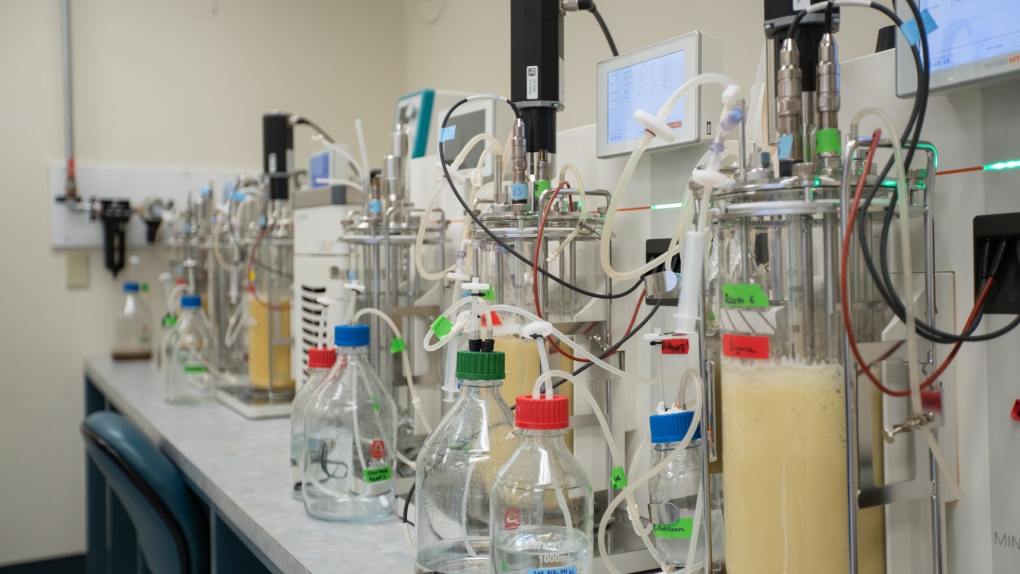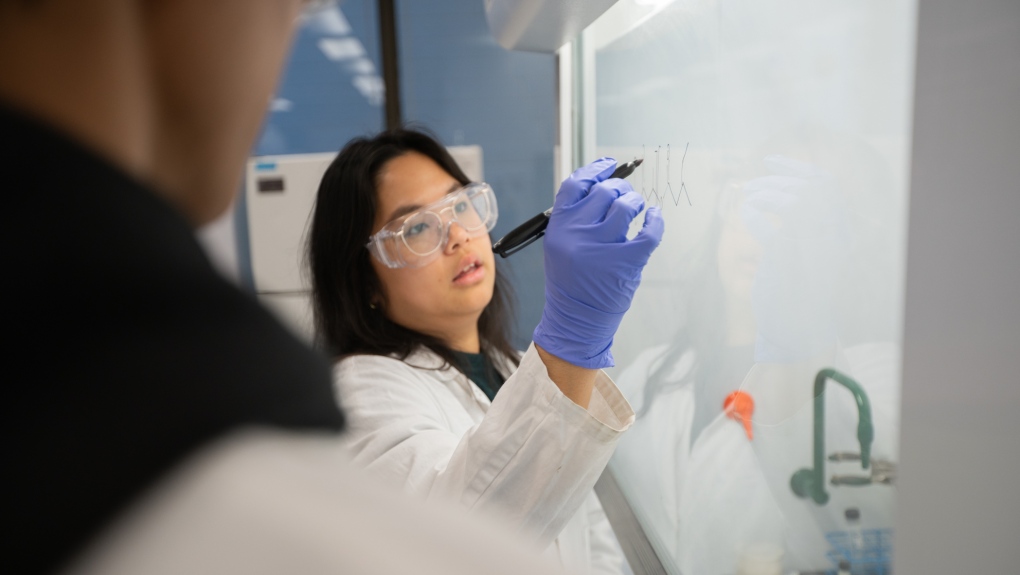This Toronto 28-year-old received a chunk of Amazon's $2B fund for her tech company
Amazon invested a portion of a $2-billion climate fund earlier this month in a company created by a 28-year-old Toronto scientist who turns food scraps into alternative plastics.
Luna Yu, CEO and founder of Genecis, says she dove into the bioplastics world at 22-years-old. At the time, her budget was dismal and approach was scrappy – but creative, as she put it.
“We went out to Canadian Tire and bought a couple of rice cookers, and then we actually retrofitted the rice cookers and made them into bioreactors ourselves,” Yu told CTV News Toronto.
The makeshift gadget she created as a fresh University of Toronto graduate emulated the aim of her company-to-be, Genecis.
“It’s super simple. It's almost like brewing beer, right? All you have to do is to actually feed food waste as a sort of energy source or food to bacteria,” Yu explained.
That bacteria consumes sugars and fatty acids from the organic waste. As it metabolizes, the bacteria converts food scraps into a biodegradable called Polyhydroxyalkanoate, or simpler, PHA.
 A reactor growing PHA is photographed at the Genecis lab (Supplied). From there, PHA is extracted, purified and compounded into pellets, which are injected into molding machines to make an alternative to single-use plastics, like food and medical packaging.
A reactor growing PHA is photographed at the Genecis lab (Supplied). From there, PHA is extracted, purified and compounded into pellets, which are injected into molding machines to make an alternative to single-use plastics, like food and medical packaging.
“One product that we sort of experimented with launching ourselves last year is in a textile market,” Yu said. Instead of making polyester shirts out of traditional synthetic plastics, Yu uses PHA as a replacement.
With a chunk of Amazon’s $2 billion Climate Pledge Fund secured, Yu is aiming to integrate her sustainable, biodegradable alternative to plastic into Amazon’s supply chain.
 Genecis employees working at the office lab (Supplied). She could not disclose the amount of money received. An Amazon spokesperson told CTV News Toronto the investment in Genecis came from the fund’s $50 million Female Founder Initiative, but could only confirm these investments range from hundreds of thousands to millions of dollars.
Genecis employees working at the office lab (Supplied). She could not disclose the amount of money received. An Amazon spokesperson told CTV News Toronto the investment in Genecis came from the fund’s $50 million Female Founder Initiative, but could only confirm these investments range from hundreds of thousands to millions of dollars.
“That's going to be able to help us altogether amplify our overall impact, right? Because our goal in the next 10 years is to essentially make PHAs as ubiquitous as possible,” Yu said.
CTVNews.ca Top Stories

W5 Investigates Canada's least wanted man: A family's long and lonely fight to bring their son home from Syria
Counterterrorism experts and humanitarian groups are urging countries to repatriate suspected ISIS members, as one family tells CTV W5 about their long and lonely fight to bring their son home from Syria.
After warmest on record, winter looks to 'salvage its reputation': Weather Network
Canada's warmest winter on record is unlikely to make a repeat performance this year, The Weather Network's chief meteorologist says, as a new seasonal forecast suggests the season will try to 'salvage its reputation.'
Elon Musk publicized the names of U.S. government employees he wants to cut. It's terrifying federal workers
When President-elect Donald Trump said Elon Musk and Vivek Ramaswamy would recommend major cuts to the federal government in his administration, many public employees knew that their jobs could be on the line.
Canada approves Novo Nordisk's obesity drug to reduce risk of non-fatal heart attack
Canada's health regulator has approved Novo Nordisk's weight loss drug Wegovy to reduce the risk of nonfatal heart attack or myocardial infarction in some adults, the Danish drugmaker said on Wednesday.
'It's intimidation': Vancouver councillors told to stop displaying children's artwork during meeting
Two Vancouver city councillors were told to remove children's artwork from their desks during Tuesday's meeting, after one of their colleagues called the display of the drawings "intimidating."
$100 million up for grabs after no Lotto Max grand prize winner Tuesday
An estimated $100 million is up for grabs, including an $80-million Lotto Max jackpot, after Tuesday night’s Lotto Max draw ended without a grand prize winner.
Two companies drop McGregor after civil jury ruled he must pay US$250K to woman who says he raped her
Two companies have cut ties with Conor McGregor after a civil court jury in Ireland ruled last week that he must pay nearly 250,000 Euros (US$257,000) to a woman who accused the mixed martial arts fighter of raping her.
The Israel-Hezbollah ceasefire quiets one front but Gaza faces continuing war
For many across the Middle East, the Israel-Hezbollah ceasefire came as a relief: the first major sign of progress in the region since war began more than a year ago.
Canadians carrying more debt and missing more payments: reports
Interest rate cuts by the Bank of Canada appear to have stimulated spending with more consumers taking on added debt, but as more people take on more credit and car loans there's also been an increase in delinquency rates.

































